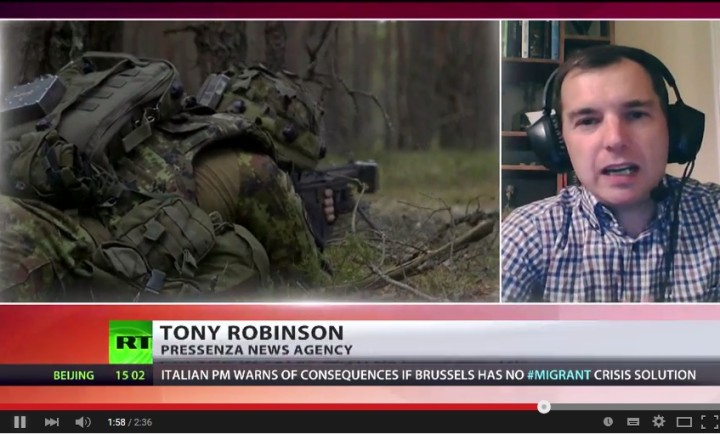Our partner agency, RT.com, requested an interview with Pressenza last night regarding the deployment of Nato troops in Europe reported in the New York Times.
Here are the written questions and answers we prepared for the live interview. The live interview varies from the written one.
RT.com: Hungary is named as one of the countries where the U.S. can possibly station its weapons. Does it feel threatened by this perceived Russian aggression?
PRESSENZA: For now it would be a surprise if Hungary would be one of these countries to host more Nato equipment. In recent months Victor Orban, the Hungarian Prime Minister has been causing displeasure in hawkish Nato capitals by suggesting that the economic sanctions against Russia should be dropped. In 2014 Orban said the EU had “shot itself in the foot” by restricting trade with Moscow and President Putin even visited Budapest in February this year to advance in energy deals. Hungary receives around 60% of its gas from Russia and relies on her to supply uranium for its nuclear power station which the two countries are talking about doubling in capacity. Hungary does share a border with Ukraine, but given the relationship between the two leaders it would be strange for them to feel threatened, especially given how much government control of the media there is in Hungary.
RT: After the fall of the Soviet Union, NATO and Russia made an agreement that there will be no Western permanent bases in Eastern Europe. Aren’t these new plans breaching this pact?
PZ: Yes, of course, and I think that Russia has every right to feel aggrieved by these moves, but Putin seems to be seeing all of this for the political posturing that it is. He gave an interesting interview with the Italian newspaper, Corriere della Sera in which he said, “I think that only an insane person and only in a dream can imagine that Russia would suddenly attack NATO.” In any case, according to the reports in the international media at the moment, those Baltic countries lined up to host these new bases will get some substantial infrastructure development which will no doubt create jobs those countries can point our as good things to their domestic audience.
RT: Is it possible that Russia will attack a NATO member given that the collective defence agreement would mean it’s attacking the entire alliance?
PZ: I did some research into military spending and if I’m reading the figures from the Stockholm International Peace Research Institute right then in the year 2013, Nato countries spent almost 11 times more on their military budgets than Russia. An attack by Russia on a Nato country would rapidly escalate into a nuclear conflict, and I think this is understood clearly in Moscow. In terms of the possibilities for winning a war with Nato, it is clear that not only could Russia not win, but most likely humanity would be extinguished from the face of the earth. Atmospheric modelling studies presented in recent conferences about the humanitarian consequences of nuclear weapons show that an exchange of 100 warheads targeted on cities would throw up enough material into the upper atmosphere to create a nuclear winter and cause the deaths of up to 2 billion human beings.
RT: Is it all just muscle-flexing or is there an actual possibility that those weapons will be used on Russia?
PZ: I’m convinced this is muscle-flexing. All of this plays well to the domestic audiences in the Baltic States and other countries such as Poland. They receive the same news being broadcast in the US which portrays Russia as the attacker of the Ukraine and as a country that annexed Crimea by force. In times of economic difficulty, history shows that flexing military muscle and creating conflicts with neighbours, scapegoating minorities and controlling the news is a tactic frequently used by desperate governments. And I think it’s become clear that the US Administration is increasingly desperate.






